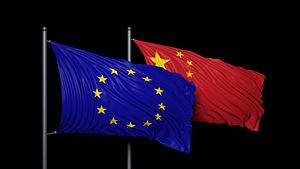We now know a little more about the world view of the current Chinese leaders. One element was delineated when President Xi Jinping visited the U.S. last year. At Sunnylands, Xi declared alongside President Obama that America and China enjoyed “great power relations.” This is flattering to both sides and, while not overtly stating it, echoes the idea of a ‘G2’, despite the resistance to this notion over the last years of the Hu and Wen era.
What “great power relations” actually means is subject to debate. It clearly doesn’t mean that China explicitly sees itself as a competitor with the U.S., militarily or politically. But the concept of “great power relations” does imply a common framework where both China and the U.S. have to work together. It alludes to a world where both powers have legitimate status and key strategic interests that the other has to respect. “Great power relations” is, in other words, great diplomacy: it gives a lot in the abstract and concedes little in practice.
Where does the EU rank in all of this? Xi Jinping is evidently a more accomplished schmoozer than his predecessor Hu Jintao, whose wooden, machine-like pronouncements abroad set off many an afternoon slumber amongst his auditors. Speaking at the College of Europe in Brussels during the first-ever visit to the European Commission by a Chinese head of state, Xi trumpeted China’s importance — long history, vast market, great future, huge promise. When he shifted to speaking of the EU, the first thing Xi alluded to, predictably, was the common interest in each other’s economies. But then he stated that “Europe is the birthplace of Western civilization.” To Xi, it is as civilizations that the EU and China have true common ground.
This is an interesting new formulation. For years, Chinese intellectuals and academics have professed weariness at the EU’s love of the moral high ground. They bemoan the EU proclivity to preach to the rest of the world and to point to its constitution, which enshrines all sorts of social, political and cultural ideals. The EU, in China’s eyes, has an ingrained sense of superiority, despite the fact that it so often collapses into disunity and incoherence over hard political issues important to China — issues like lifting the arms embargo, which the EU failed to do in 2005 thanks to U.S. pressure, or granting China market economy status, a distinction given long ago to the far less capitalist Russian economy.
Flattering the EU by calling it a “great civilization” as Xi did in March solves a number of issues. It grants the EU a defined status and space in the Chinese elites’ world view. It acknowledges the things that China clearly likes about the EU – culture, history, knowledge, expertise. But it also avoids according the EU the sort of coherent, hard political clout that the words “great power” would give. Almost as though following the Confucian “doctrine of names,” China has now finally come up with the words that can define this bewildering, perplexing superstate that is not a superstate. Even Xi slipped and called the EU a “country” in the early part of his speech, in a sign of how hard it is to conceptualize what the EU really is. Calling it a “civilization” finally creates some sort of parity and common ground between China and Europe. They are both civilizations. On this basis, they can develop their relations and understand each other.
For all Xi’s flattery though, the real message was contained in a policy paper issued by the State Council in April, an update to the decade-old paper that had spelled out the nature of the China-EU strategic partnership for the first time. The title “Deepen the China-EU Comprehensive Strategic Partnership for Mutual Benefit and Win-win Cooperation” had an ominously Hu-ist tone to it, but the document pulled no punches. “China asks the EU and its member states not to support Taiwan’s accession to any international organizations whose membership requires statehood” … The EU should “not allow leaders of the Dalai group to visit the EU or its member states under any capacity of pretext” … The EU should “stop using individual [human rights] cases to interfere in China’s judicial sovereignty and internal affairs.”
Great civilizations China and Europe might be, at least rhetorically, but this paper makes clear that the values on which they rest are still worlds apart. And it looks clear that, far from being a flattering move by Xi, his remarks in Brussels signified a more confident leadership. Xi showed that China is willing to march into the halls of one of their most difficult but important partners and to say, politely but firmly, that real differences still remain — and that China will not be taking the blame if things don’t work out.

































